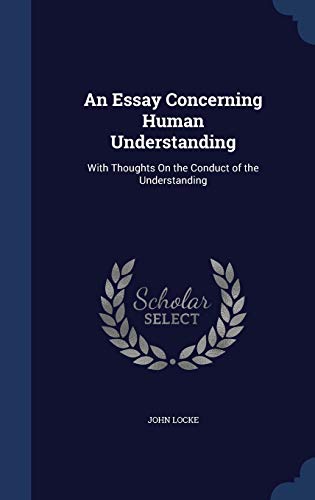An Essay Concerning Human Understanding: With Thoughts On the Conduct of the Understanding - Hardcover

This work has been selected by scholars as being culturally important, and is part of the knowledge base of civilization as we know it. This work was reproduced from the original artifact, and remains as true to the original work as possible. Therefore, you will see the original copyright references, library stamps (as most of these works have been housed in our most important libraries around the world), and other notations in the work.
This work is in the public domain in the United States of America, and possibly other nations. Within the United States, you may freely copy and distribute this work, as no entity (individual or corporate) has a copyright on the body of the work.
As a reproduction of a historical artifact, this work may contain missing or blurred pages, poor pictures, errant marks, etc. Scholars believe, and we concur, that this work is important enough to be preserved, reproduced, and made generally available to the public. We appreciate your support of the preservation process, and thank you for being an important part of keeping this knowledge alive and relevant.
This work is in the public domain in the United States of America, and possibly other nations. Within the United States, you may freely copy and distribute this work, as no entity (individual or corporate) has a copyright on the body of the work.
As a reproduction of a historical artifact, this work may contain missing or blurred pages, poor pictures, errant marks, etc. Scholars believe, and we concur, that this work is important enough to be preserved, reproduced, and made generally available to the public. We appreciate your support of the preservation process, and thank you for being an important part of keeping this knowledge alive and relevant.
"synopsis" may belong to another edition of this title.
Review:
"Oxford World Classics offers yet another abridgment of Locke s Essay Concerning Human Understanding. Do we really need another? Yes, when it s as well done as
Phemister s."-Philosophy in Review
About the Author:
"Oxford World Classics offers yet another abridgment of Locke s Essay Concerning Human Understanding. Do we really need another? Yes, when it s as well done as
Phemister s."-Philosophy in Review
"Oxford World Classics offers yet another abridgment of Locke s Essay Concerning Human Understanding. Do we really need another? Yes, when it s as well done as Phemister s."-Philosophy in Review
JOHN LOCKE was born August 29, 1632, in Somerset, England, the son of landed English gentry. He entered Christ Church College of Oxford Univer-sity in 1652 and passed through the academic ranks quite uneventfully, later assuming a teaching post at the university. To escape ordination in the Church of England--a natural bureaucratic step toward university pro-motion--Locke took up the study of medicine and was transported into a new world of "natural philosophy" in which he associated with powerful scientific minds like that of Robert Boyle. It was through his concern for the authority of the state in religious matters and the Natural Law used to support it that Locke became inter-ested in the role of Natural Law in experience--a curiosity that led him to philosophy, and more particularly to epistemology, as an avocation. Add to his interest in Natural Law the sociopolitical climate of seventeenth-century England--steeped in violent civil war, counter-revolution, restoration, deposition of the monarchy and the subsequent Parliamentary rule, and the eventual restoration of the monarchy late in the century--along with an intellectual stage dominated by the authoritarianism of Thomas Hobbes's Leviathan, and one can begin to sense the pressures at work on Locke. After accepting a brief diplomatic mission to Madrid in 1665, Locke retreated to his teaching and medical experiments. His real political educa-tion was to come quite by accident as a result of an association with the first Earl of Shaftesbury, a wealthy and extremely powerful figure who had survived the vicissitudes of England's political turbulence. Initially employed as the Earl's medical advisor, Locke later became a permanent member of the household. It was here under the skillful tutelage of Shaftesbury that Locke matured as a social philosopher. The political intrigues in which the Earl was engaged caused Locke to be exiled, though he later returned to England after the Glorious Revolution that saw William and Mary placed on the English throne in 1688. Locke's famous Two Treatises of Government, of which the second is most widely read, are an outgrowth of his original political proclivities, the sociopolitical chaos plaguing England during his lifetime, and his associa-tion with the Earl of Shaftesbury. Locke's dedication to individual liberty, government by consent, the social contract, and the right to revolt against governments that endanger the rights of citizens, has made him one of the most important political thinkers of the past four centuries. His legacy will live on as long as there are people fighting for freedom. He died in Oates, England, on October 28, 1704. Some of John Locke's major works include: A Letter for Toleration (1689), Two Treatises of Government (1690), An Essay Concerning Human Understanding (1693), Some Thoughts Concerning Education (1693), and The Reasonableness of Christianity (1695).
"About this title" may belong to another edition of this title.
- PublisherSagwan Press
- Publication date2015
- ISBN 10 1298983495
- ISBN 13 9781298983497
- BindingHardcover
- Number of pages282
- Rating
(No Available Copies)
Search Books: Create a WantIf you know the book but cannot find it on AbeBooks, we can automatically search for it on your behalf as new inventory is added. If it is added to AbeBooks by one of our member booksellers, we will notify you!
Create a Want
